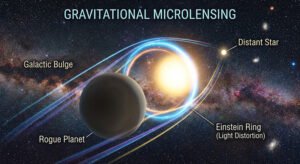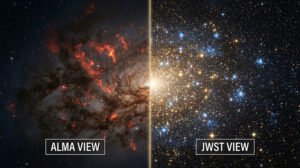Key Takeaways 📝
- Dark energy, a mysterious force, accelerates the expansion of the universe, challenging our understanding of the cosmos.
- Observations of distant supernovae provide compelling evidence for the accelerating expansion of the universe due to dark energy.
- Theoretical frameworks like the cosmological constant and quintessence attempt to explain the nature of dark energy.
- Dark energy’s repulsive force counteracts gravity, leading to cosmic acceleration and shaping the large-scale structure of the universe.
- Research efforts, such as large-scale galaxy surveys and upcoming missions like DESI and JWST, aim to unravel the mysteries of dark energy and its implications for the fate of the universe.
Dark energy is one of the most mysterious and perplexing phenomena in the universe. It was first discovered in the late 1990s, when astronomers were trying to understand the expansion of the universe. The discovery of dark energy revolutionized our understanding of the cosmos and raised many questions about the nature of the universe.
Dark energy is a term used to describe the unknown force that is causing the expansion of the universe to accelerate. It is called “dark” because it cannot be directly observed or detected using current technology. Instead, its existence is inferred from its effects on other objects in the universe.
Understanding the Expansion of the Universe
The concept of an expanding universe was first proposed by Belgian astronomer Georges Lemaître in 1927. He suggested that if the universe was expanding, then galaxies would be moving away from each other. This idea was later confirmed by American astronomer Edwin Hubble, who observed that galaxies were indeed moving away from each other.
Hubble’s observations led to the formulation of Hubble’s law, which states that the velocity at which a galaxy is moving away from us is directly proportional to its distance from us. This law provided strong evidence for an expanding universe and laid the foundation for our understanding of cosmic expansion.
Theoretical Framework for Dark Energy
In order to explain the accelerating expansion of the universe, scientists turned to Albert Einstein’s theory of general relativity. Einstein had originally introduced a term called the cosmological constant into his equations to account for a static universe. However, after Hubble’s discovery, Einstein famously referred to this term as his “greatest blunder.”
The cosmological constant represents a form of energy that is inherent to space itself and has a repulsive effect on matter and radiation. It can be thought of as a sort of “anti-gravity” force that counteracts the attractive force of gravity. This repulsive force is what is believed to be driving the accelerated expansion of the universe.
Alternative theories for dark energy have also been proposed, such as quintessence, which suggests that dark energy is a dynamic field that changes over time. Other theories propose modifications to Einstein’s theory of general relativity, such as modified gravity or extra dimensions, to explain the observed acceleration.
The Evidence for Dark Energy
There are several lines of evidence that support the existence of dark energy. One of the most compelling pieces of evidence comes from observations of distant supernovae. Supernovae are exploding stars that can be used as “standard candles” to measure cosmic distances. By studying the brightness and redshift of these supernovae, scientists have found that they are fainter than expected, indicating that the universe is expanding at an accelerating rate.
Another piece of evidence comes from the cosmic microwave background radiation (CMB), which is the residual radiation from the Big Bang. The CMB provides a snapshot of the early universe and can be used to study its large-scale structure. By analyzing the fluctuations in the CMB, scientists have found that the universe is flat and contains a certain amount of energy density, which is consistent with the presence of dark energy.
The large-scale structure of the universe also provides evidence for dark energy. Galaxies are not randomly distributed in space, but instead form clusters and filaments that are separated by vast voids. The distribution of these structures can be used to measure the expansion rate of the universe and infer the presence of dark energy.
The Impact of Dark Energy on the Universe
The existence of dark energy has profound implications for the fate of the universe. If dark energy continues to dominate, it will eventually cause all galaxies outside our local group to move away from us faster than the speed of light. This means that in the far future, other galaxies will become invisible to us, leading to a lonely and isolated universe.
Dark energy also plays a crucial role in the formation and evolution of galaxies. It is believed to have influenced the growth of large-scale structures in the early universe, as well as the distribution of matter and the formation of galaxy clusters. Without dark energy, the universe would look very different and galaxies may not have formed at all.
The Role of Dark Energy in Cosmic Acceleration

Cosmic acceleration refers to the phenomenon of the expansion of the universe speeding up over time. Dark energy is believed to be the driving force behind this acceleration. The exact nature of dark energy is still unknown, but it is thought to be a form of energy that is uniformly distributed throughout space.
Dark energy contributes to cosmic acceleration by exerting a repulsive force on matter and radiation. As the universe expands, more space is created, and dark energy becomes more dominant. This causes the expansion to accelerate, as the repulsive force of dark energy counteracts the attractive force of gravity.
The Relationship between Dark Energy and Dark Matter
Dark energy and dark matter are often confused, but they are actually two distinct phenomena. Dark matter is a form of matter that does not interact with light or other forms of electromagnetic radiation. It is believed to make up about 27% of the total mass-energy content of the universe.
Dark energy, on the other hand, is a form of energy that is causing the expansion of the universe to accelerate. It is not associated with any known particle or field and its exact nature remains a mystery. Dark energy is thought to make up about 68% of the total mass-energy content of the universe.
Despite their differences, there may be some connections between dark energy and dark matter. Some theories propose that dark energy and dark matter are related through a common underlying mechanism, while others suggest that they are completely independent phenomena.
The Search for the Nature of Dark Energy
Understanding the nature of dark energy is one of the biggest challenges in modern cosmology. Scientists are currently conducting a wide range of research efforts to try and unravel the mystery of dark energy.
One approach is to study the properties of dark energy using large-scale surveys of galaxies and other astronomical objects. These surveys can provide valuable information about the distribution and clustering of matter in the universe, which can help constrain the properties of dark energy.
Another approach is to study the cosmic microwave background radiation in more detail. Future experiments, such as the European Space Agency’s Euclid mission and NASA’s WFIRST mission, will map the CMB with unprecedented precision, allowing scientists to probe the early universe and gain insights into the nature of dark energy.
The Future of Dark Energy Research
The field of dark energy research is rapidly evolving, with many exciting experiments and observations on the horizon. One upcoming experiment is the Dark Energy Spectroscopic Instrument (DESI), which will measure the positions and distances of millions of galaxies to study the expansion history of the universe.
Another upcoming mission is the James Webb Space Telescope (JWST), which will be able to observe distant supernovae and study their properties in more detail. The JWST will also be able to study the formation and evolution of galaxies, providing valuable insights into the role of dark energy in shaping the universe.
Implications of Dark Energy for the Fate of the Universe
The discovery of dark energy has profound implications for our understanding of the universe and its future. If dark energy continues to dominate, it will eventually cause all galaxies outside our local group to move away from us faster than the speed of light. This means that in the far future, other galaxies will become invisible to us, leading to a lonely and isolated universe.
However, there are other possible scenarios for the future of the universe. Some theories suggest that dark energy may change over time or that new forms of energy may emerge, leading to a different fate for the universe. Continued research on dark energy is crucial in order to gain a better understanding of its nature and its implications for the fate of the universe.
In conclusion, dark energy is one of the most intriguing and mysterious phenomena in the universe. Its discovery has revolutionized our understanding of the cosmos and raised many questions about the nature of the universe. Scientists are currently conducting a wide range of research efforts to try and unravel the mystery of dark energy, with many exciting experiments and observations on the horizon. Continued research on dark energy is crucial in order to gain a better understanding of its nature and its implications for the fate of the universe.
If you’re curious about the role of dark energy in the expansion of the universe, you might find this article from The Universe Episodes website quite intriguing. It delves into the fascinating concept of dark energy and its impact on the ever-expanding cosmos. To learn more about this cosmic phenomenon, check out their article here.
FAQs
What is dark energy?
Dark energy is a hypothetical form of energy that is believed to permeate all of space and accelerate the expansion of the universe.
What is the role of dark energy in the expansion of the universe?
Dark energy is thought to be the driving force behind the accelerating expansion of the universe. It counteracts the gravitational pull of matter, causing the expansion to accelerate over time.
How was dark energy discovered?
Dark energy was first proposed in the late 1990s by astronomers studying distant supernovae. They found that the supernovae were dimmer than expected, suggesting that the expansion of the universe was accelerating.
What is the difference between dark energy and dark matter?
Dark matter is a form of matter that does not emit, absorb, or reflect light, and is therefore invisible to telescopes. It is believed to make up about 27% of the universe’s total mass. Dark energy, on the other hand, is a form of energy that is thought to be responsible for the accelerating expansion of the universe.
What are some theories about the nature of dark energy?
There are several theories about the nature of dark energy, but none have been proven. Some scientists believe that dark energy is a property of space itself, while others think it may be related to the Higgs boson or other fundamental particles.
What are the implications of dark energy for the future of the universe?
If dark energy continues to accelerate the expansion of the universe, it could eventually lead to a “Big Freeze” scenario in which the universe becomes cold and dark. However, there are other possible outcomes depending on the nature of dark energy and other factors.
My Summary and Thoughts about Dark Energy
I find this article on dark energy to be fascinating and thought-provoking. It sheds light on the mysterious force that accelerates the expansion of the universe, challenging our understanding of the cosmos. The benefits of reading this article include gaining insights into the nature of dark energy, its theoretical frameworks, evidence supporting its existence, and its implications for the fate of the universe.
Benefits of Reading
Reading this article offers a deeper understanding of dark energy, its role in cosmic acceleration, and its relationship with dark matter. It also provides valuable information on theoretical frameworks like the cosmological constant and quintessence, as well as ongoing research efforts to unravel the mysteries surrounding dark energy.
Main Message
The main message of this article is to explore the enigmatic concept of dark energy and its profound impact on the universe. It highlights how dark energy drives cosmic acceleration, challenges traditional theories of gravity, and influences the large-scale structure of the universe. By delving into dark energy, we can gain valuable insights into the fate and evolution of our cosmos.
























